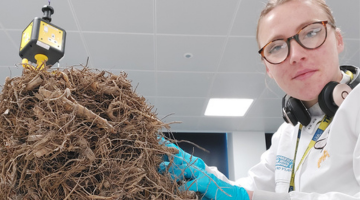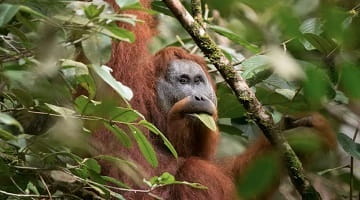2024/25 entry
BSc (Hons) Animal Behaviour
Clearing
Want to study with LJMU this September? Visit our Clearing hub to apply now if you have your grades or register your interest and become a Clearing Insider to receive updates while you wait for your results. Your journey starts with Clearing.
Minimum UCAS points required: TBC
Why study Animal Behaviour at Liverpool John Moores University?
- Study the behaviour of wild and captive animals, with opportunities for overseas fieldwork
- Regular field trips and visits to observe the behaviour of animals, including residential fieldwork at Level 4 to Millport, Isle of Cumbrae in Scotland
- Optional residential fieldwork (partially self-funded) at level 5 (possible destination Cairngorms National Park, Scotland) and level 6 (possible destination Coto Doñana, Spain)
- Taught by animal behaviour experts at the forefront of modern research
- Opportunities for work-related learning, study abroad and/or a year-long sandwich placement
- Specialist lectures from visiting animal behaviour experts
- This degree is available to study following a foundation year
- International Foundation Year course available offering direct progression onto this degree programme - visit LJMU's International Study Centre to find out more
About your course
Studying BSc (Hons) Animal Behaviour at Liverpool John Moores University will give you an opportunity to learn from experts in animal behaviour and complete work-related learning with a variety of animal-related organisations, such as zoos, wildlife parks, conservation NGOs and rescue centres. The degree develops your understanding of the science of animal behaviour in relation to evolution, ecology, physiology, neurobiology and genetics, preparing students for a career in science, animal welfare, animal behaviour research, the emergency services or conservation.
This course gives you the understanding to answer questions such as 'how and why does behaviour vary between individuals, groups and species' and 'how is behaviour shaped by the past (evolutionary history) and the present (the environment), and regulated by genes, physiology and neurobiology?'
Modules cover animal behaviour in a range of environments from natural behaviour in the tropics and temperate habitats; terrestrial, freshwater and marine ecosystems; through to the behaviour and welfare of domestic and captive animals.
Regular field work underpins the development of theoretical knowledge, giving students the practical skills to engage in the study of animal behaviour. An important part of the programme is the training in scientific observational methods. Students will have opportunities to try out their techniques on wild animals in the UK, including in our on-campus wildlife gardens, and abroad, as well as on captive animals in the world famous Chester Zoo, Martin Mere Wetland Centre, Blue Planet Aquarium and Knowsley Safari Park, which are all close by, along with a range of natural habitats and protected areas.
There is a core residential field trip in Level 4 and an optional residential field trip during Level 5. Students can also take part in an advanced field skills expedition during Level 6 the possible destination is the superb Coto Doñana area in southern Spain to observe first-hand how animals behave in their natural habitats. You can also choose to study at a different university for one semester in our Study Abroad Programme.
On top of your academic studies, you will have the opportunity to undertake a short (4-6 week) work-based placement and/or a year's sandwich placement in the UK or abroad. Placements give you a chance to put your skills and knowledge into practice, as well as developing personal and subject-related skills and acquiring new skills to enhance your CV. They could even lead to employment with the same organisation or through the contacts you make. The first year of the course is very similar to LJMU's Zoology programme and as these are sister degrees you can transfer between programmes if you complete Level 4 successfully.
"I found the course incredibly interesting and it really sparked my love and curiosity for science. It covers many different aspects of animal behaviour so when you graduate you can choose which path you would like to take whether it is wildlife conservation, animal training or the behaviour and welfare of pets or production animals"
Professional accreditation/links
Professional organisations such as the Association for the Study of Animal Behaviour (ASAB) offer membership.
Fees and funding
There are many ways to fund study for home and international students
Fees
The fees quoted above cover registration, tuition, supervision, assessment and examinations as well as:
- Library membership with access to printed, multimedia and digital resources
- Access to programme-appropriate software
- Library and student IT support
- Free on-campus wifi via eduroam
Additional costs
Although not all of the following are compulsory/relevant, you should keep in mind the costs of:
- accommodation and living expenditure
- books (should you wish to have your own copies)
- printing, photocopying and stationery
- PC/laptop (should you prefer to purchase your own for independent study and online learning activities)
- mobile phone/tablet (to access online services)
- field trips (travel and activity costs)
- placements (travel expenses and living costs)
- student visas (international students only)
- study abroad opportunities (travel costs, accommodation, visas and immunisations)
- academic conferences (travel costs)
- professional-body membership
- graduation (gown hire etc)
Funding
There are many ways to fund study for home and international students. From loans to International Scholarships and subject-specific funding, you'll find all of the information you need on our specialist funding pages.
* Practical and field activities underpin all programmes in the School of Biological and Environmental Sciences. PPE is provided for all necessary practical work. There are no costs for day field trips for core and optional modules. Residential field trips associated with core modules are subsidised and include travel and half-board accommodation costs. Any residential field trips for optional modules are also subsidised, but will have costs involved. Locations may be subject to change and also subject to national and international travel restrictions.
A DBS check is not required for your application, however a DBS may be required for modules where there is a work based learning placement option. Work based learning placements that do not require a DBS check are available.
Employability
You will enjoy varied career opportunities both in the UK and overseas
You might, on the other hand, prefer to practise as a professional animal behaviourist after some further postgraduate study and clinical training.
Recent LJMU graduates have secured full-time employment in roles such as Research Officers, Animal Colony Managers and Animal Welfare Coordinators. Organisations that have hired our graduates include: Combe Martin Wildlife Park, Chester Zoo, Dolphin Quest, Durrell Wildlife Conservation Trust, Genus, Newquay Zoo, North Clwyd Animal Rescue, RSPCA and Reaseheath College.
Other graduates have opted for postgraduate study (teacher training, MSc, MPhil or PhD), pursuing a career in science and academia or other competitive undergraduate courses (such as medicine, veterinary science or midwifery). Some have also set up their own businesses (including a pet behaviour consultancy) or have taken non-animal related graduate employment.
Student Futures - Careers, Employability and Enterprise Service
A wide range of opportunities and support is available to you, within and beyond your course, to ensure our students experience a transformation in their career trajectory. Every undergraduate curriculum includes Future Focus during Level 4, an e-learning resource and workshop designed to help you to develop your talents, passion and purpose.
Every student has access to Careers Zone 24/7, LJMU's suite of online Apps, resources and jobs board via the LJMU Student Futures website. There are opportunities for flexible, paid and part-time work through Unitemps, LJMU's in-house recruitment service, and we also offer fully funded Discovery Internships.
One-to-one careers and employability advice is available via our campus-based Careers Zones and we offer a year-round programme of events, including themed careers and employability workshops, employer events and recruitment fairs. Our Start-Up Hub can help you to grow your enterprise skills and to research, plan and start your own business or become a freelancer.
A suite of learning experiences, services and opportunities is available to final year students to help ensure you leave with a great onward plan. You can access LJMU's Careers, Employability and Start-up Services after you graduate and return for one-to-one support for life.
Go abroad
LJMU aims to make international opportunities available to every student. You may be able to study abroad as part of your degree at one of our 100+ partner universities across the world. You could also complete a work placement or apply for one of our prestigious worldwide internship programmes. If you wanted to go abroad for a shorter amount of time, you could attend one of our 1-4 week long summer schools.
Our Go Citizen Scheme can help with costs towards volunteering, individual projects or unpaid placements anywhere in the world. With all of these opportunities at your feet, why wouldn’t you take up the chance to go abroad?
Find out more about the opportunities we have available via our Instagram @ljmuglobalopps or email us at: goabroad@ljmu.ac.uk.
A life-changing experience
There's so much more to university than just studying for a degree.
News and views
Browse through the latest stories and updates from the University and beyond
What you will study on this degree
Please see guidance below on core and option modules for further information on what you will study.
Further guidance on modules
Modules are designated core or optional in accordance with professional body requirements, as applicable, and LJMU’s Academic Framework Regulations. Whilst you are required to study core modules, optional modules provide you with an element of choice. Their availability may vary and will be subject to meeting minimum student numbers.
Where changes to modules are necessary these will be communicated as appropriate.
Level 4
Core modules
Animal Physiology
20 credits
This module provides you with an introduction to the major physiological processes and homoeostasis in animals. Adopting an adaptive approach, this module follows the development of animal organ systems according to influential environmental drivers.
Level 6
Core modules
Research Project
40 credits
The research project will be in any area appropriate to your programme of study on a topic of your choice. The module provides an opportunity for you to independently develop and demonstrate project planning, time-management and organisational inter-personal skills, along with scientific and practical working methods in a research or applied context.
Teaching and work-related learning
Excellent facilities and learning resources
We adopt an active blended learning approach, meaning you will experience a combination of face-to-face and online learning during your time at LJMU. This enables you to experience a rich and diverse learning experience and engage fully with your studies. Our approach ensures that you can easily access support from your personal tutor, either by meeting them on-campus or via a video call to suit your needs.
Teaching is via a combination of lectures, fieldwork, laboratory work, workshops, tutorials, and online with emphasis on either a research project and/or work-related learning in the third year. This independent study is an important aspect of the course as it gives you a chance to put into practice skills and knowledge gained in Levels 4 and 5.
Work-related learning
This course provides plenty of opportunities for first-hand experience of working in the animal behaviour field via an optional year-long sandwich placement between Levels 5 and 6, and/or a short 4-6 week work-related learning placement in Level 6.
A placement tutor will help you find the right placement, either in the UK or overseas, and once you start, you will have regular support from a supervisor.
Support and guidance
Dedicated personal tutor, plus study skills support
There will be times during your course when you need guidance and advice related to your academic studies or more personal matters. For this reason, you will be allocated a personal tutor for the duration of your course. You will be able to discuss course material informally as part of a small tutorial group and also have one-to-one progress review meetings. You will also be allocated a supervisor for your project or work-related learning, and your year-long placement if you choose the sandwich option.
The school is fully committed to promoting a learning environment that supports a culture of equality, diversity and inclusivity (EDI) and has a Disability Support Coordinator, an EDI Coordinator and a School EDI Working Group. Personal Tutors also play a vital role in promoting awareness of support services for students.
Assessment
Assessment varies depending on the modules you choose, but will usually include a combination of exams and coursework.
End of year exams may include a range of question types such as multiple choice, short answer, interpretative, problem-based learning and essay, whereas coursework assessments are made up of phase tests, fieldwork/practical reports, data handling, oral presentations, poster presentations, group discussions, essays or the evaluation of practical skills. While most of your assessments will be based on individual work you will also complete some group work.
Feedback on coursework assessments is normally provided within three weeks of submission and may be via Canvas (our virtual learning environment), face-to-face or in writing. We believe that constructive feedback is vital in helping you identify your strengths as well as the areas where you may need to put in more work.
Course tutors
Our staff are committed to the highest standards of teaching and learning
Dr Adam Reddon
Programme Leader
Adam is a Senior Lecturer in Behavioural Ecology. His interests lie in better understanding animal social behaviour through the integration of functional, developmental and mechanistic approaches. Some of his current projects are focused on signalling in dominance interactions, how social context during development influences cognition, and the neuroendocrine mediators of dominance relationships. Adams research has been supported by the Natural Sciences and Engineering Research Council of Canada and the Royal Society. He is currently an Associate Editor for three scholarly journals: Royal Society Open Science, Journal of Zoology, and Behaviour.
I enjoy sharing my passion for animal behaviour with the next generation of animal behaviourists. I especially enjoy translating my research into teaching materials.
Facilities
What you can expect from your School
You will study at the Byrom Street site in the university's City Campus in the heart of Liverpool. You will have access to first class teaching facilities, laboratories and study areas. The Avril Robarts library is within easy walking distance and here you'll find all the information you need to support your studies.
The university reserves the right to withdraw or make alterations to a course and facilities if necessary; this may be because such changes are deemed to be beneficial to students, are minor in nature and unlikely to impact negatively upon students or become necessary due to circumstances beyond the control of the university. Where this does happen, the university operates a policy of consultation, advice and support to all enrolled students affected by the proposed change to their course or module.
Further information on the terms and conditions of any offer made, our admissions policy and the complaints and appeals process.












